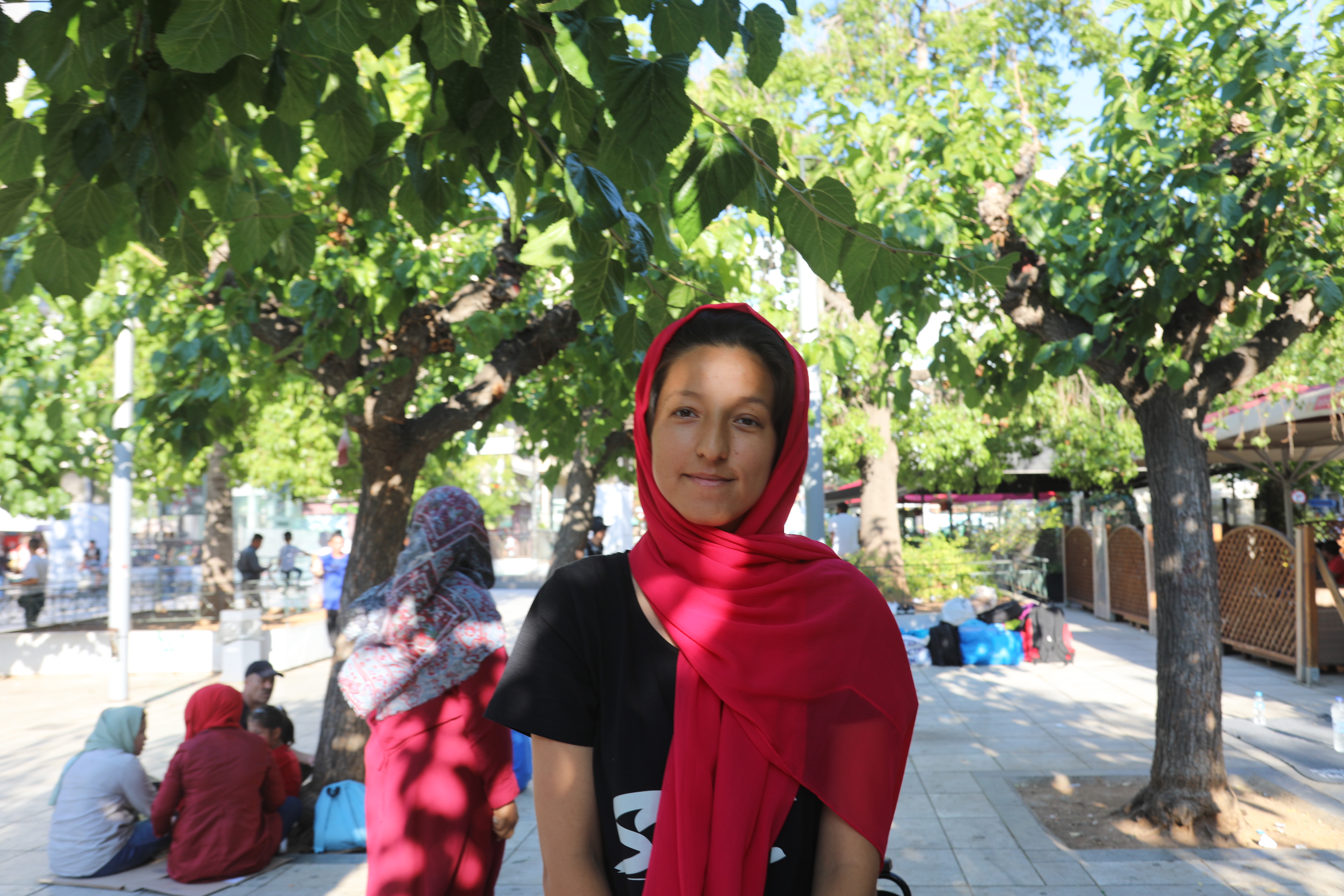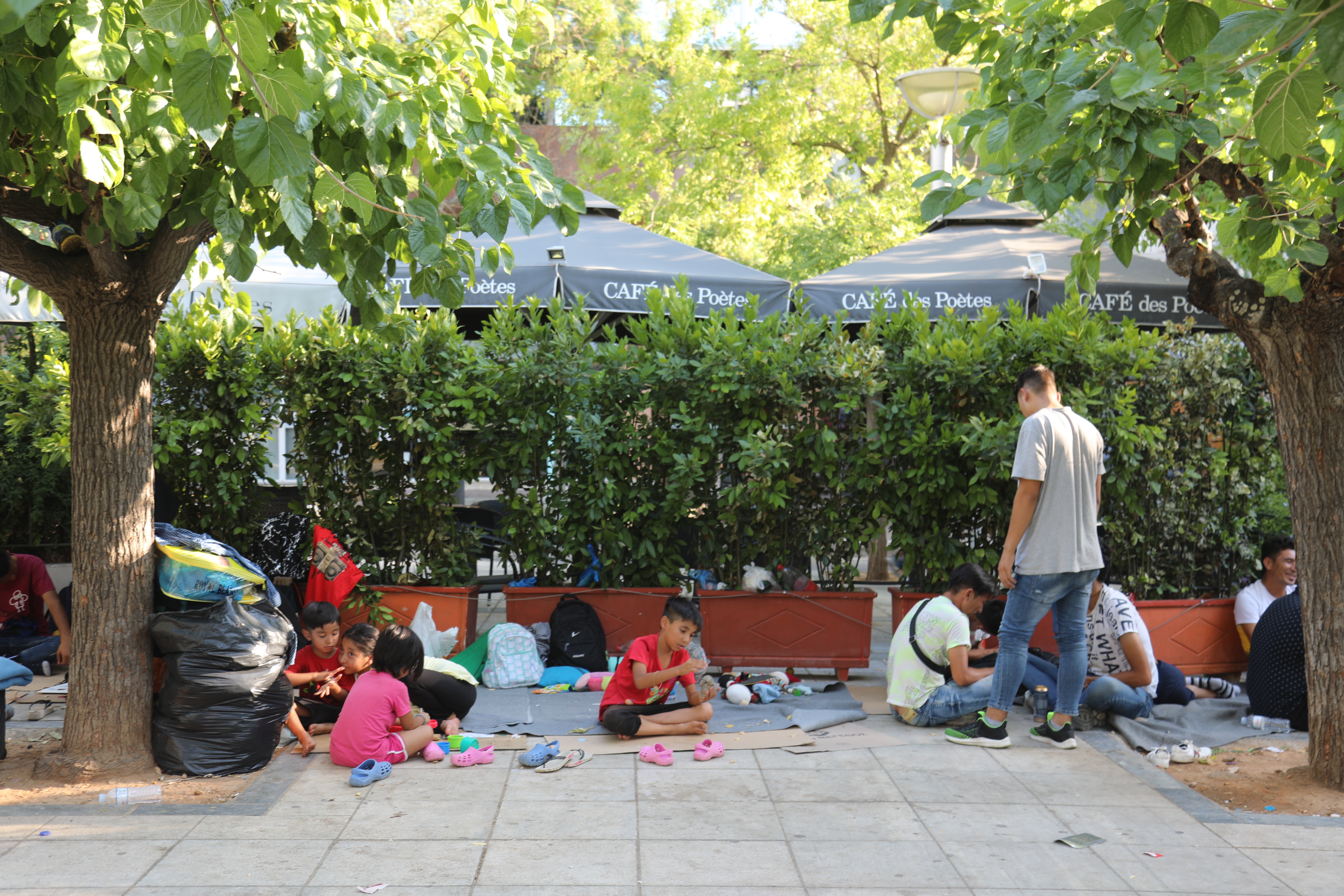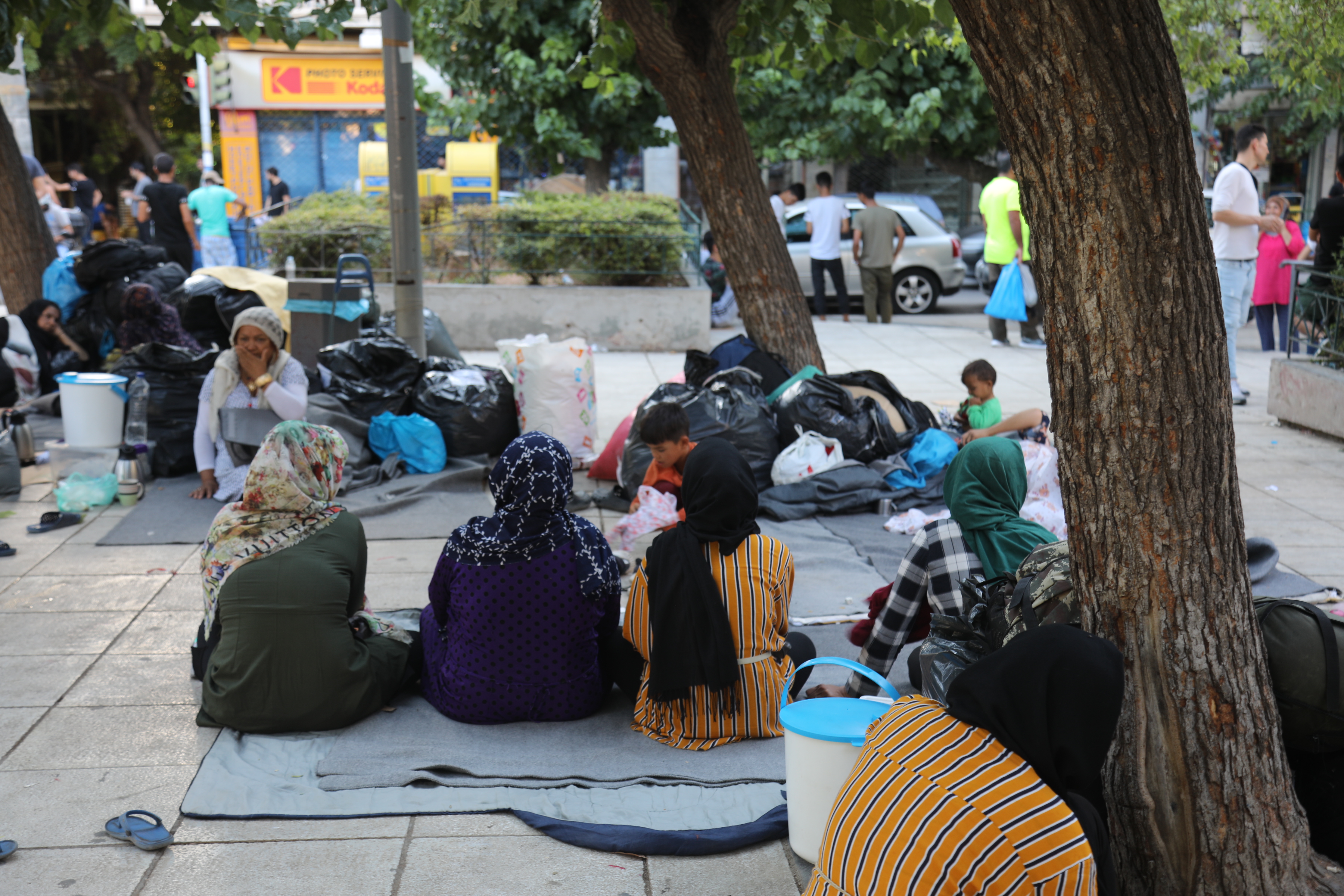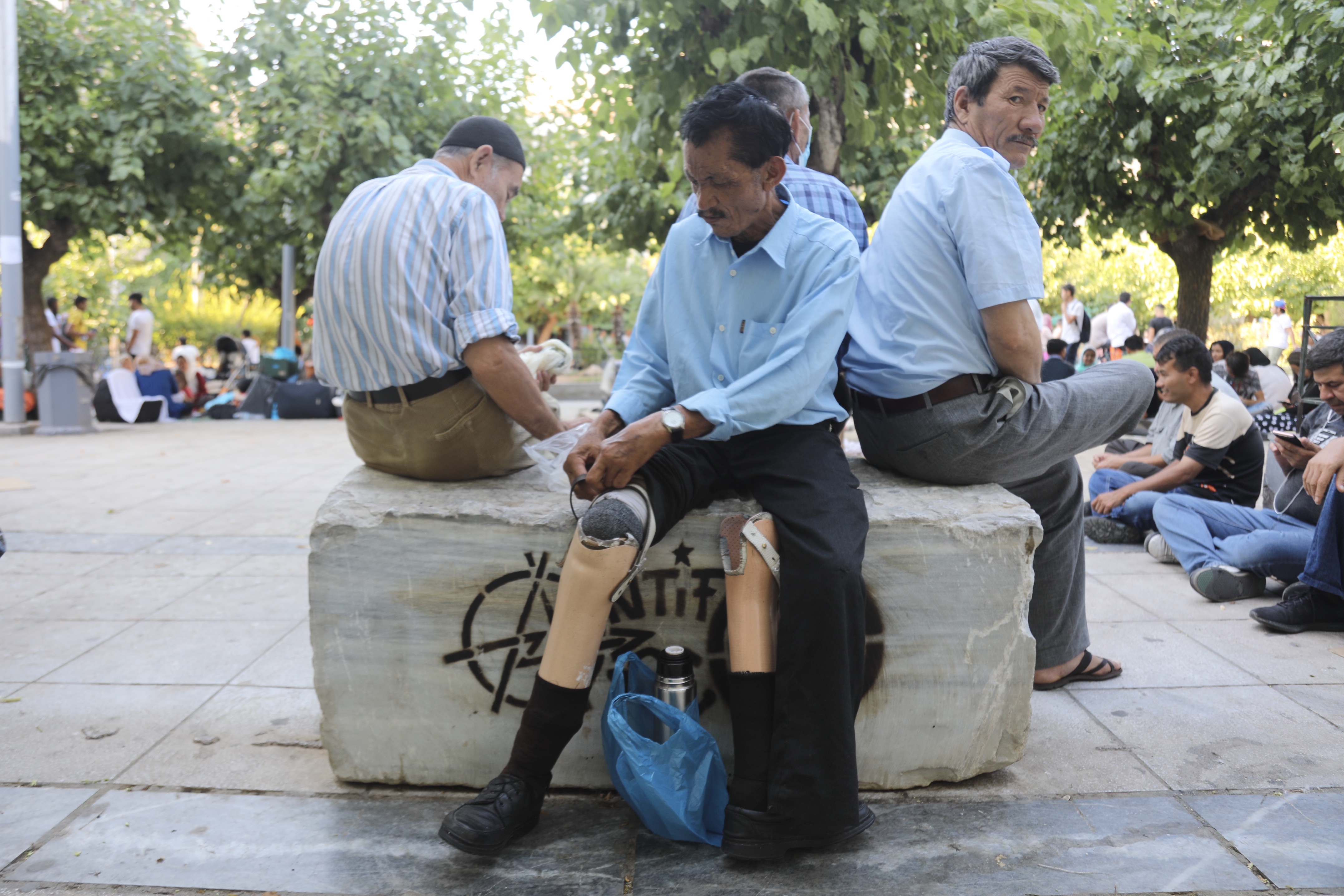Jafari Roqaye will never forget the day when she saw the remains of a young girl burnt to a crisp in Moria, Greece’s infamous refugee camp on the island of Lesbos. A fire had broken out and blazed through ramshackle containers used as living quarters. “The body was like charcoal,” she told VICE News. “You couldn’t see if it was a girl or a boy or even a human anymore. But Moria is better than where I am now.”
Having fled Iran for her safety, Roqaye, a 26-year-old single mother, spent ten months living in Moria before arriving in Athens a week ago. She, along with hundreds of mostly Afghan refugees, now sleeps on the floor of the city centre’s tree-lined Victoria Square. Newborn babies and disabled elderly are among those camping on mats and cardboard boxes, exposed to blistering heat and without regular food or water.

“Do you know how it feels to have your child sleeping on the ground with no blanket?” says Roqaye. “She’s covered in mosquito bites. My daughter is seven-years-old. She should be studying hard now for her future. Instead we’re in this hell.”
Roqaye left Moria after waiting ten months for an identity card that never came – in Greece’s strained and limited asylum system, applications can often take years to process. But in June, the situation took an even more brutal turn as a law brought in by the country’s centre-right government reduced the period officially-recognised refugees could be sheltered in temporary accommodation from six months to 30 days.
Since then, Greek asylum authorities have begun to evict more than 11,000 men, women and children awarded refugee status from Greece’s camps and UN-managed facilities, in a move described by Oxfam as “inhumane”. The New Democracy administration claims it is necessary to reduce overcrowding on the Aegean islands – more than 28,000 people live in camps originally built with a capacity of 6,095 – and to ease their future integration into the economy. The migration ministry ignored requests for comment.

But with a vastly inadequate system working at overcapacity, once evicted many refugees have been left without homes or any kind of state support. Technically entitled to work and apply for tax and social insurance numbers, lockdown has delayed the process and jobs are impossible to find. “It’s pushing them into poverty and homeless,” says Stella Nanou, the Greek representative for the UN Refugee Agency (UNHCR). “The assistance is ending in a premature manner and there is no safety net to protect them.”
Every few days, police come to take refugees from Victoria Square either to the Elaionas camp in the city centre or the Skaramangas and Schisto reception centres on the outskirts of Athens. But Nanou warns those facilities are “vastly overcrowded” with many refugees forced to sleep on the floor.
Advocacy groups believe that Greece’s flawed system of integrating refugees is at the root of the issue. “The law might be fair if the integration system was in place, but unfortunately in Greece we don’t have that system,” says Lefteris Papagiannakis, head of advocacy, policy and research at Athens-based refugee charity SolidarityNow. “We haven’t for years. We need a complete integration project from the day refugees arrive.”
The International Organisation for Migration (IOM) runs an integration programme, HELIOS, that offers language courses, employment and accommodation support. But the scheme can take a year, with only a limited number of people processed at a time. “Some refugees have found jobs, but the numbers are too low,” says Gianluca Rocco, Greece chief of mission IOM. In the meantime, they sleep in Victoria Square.
Others are less understanding of the Greek government’s predicament. “The policy from the government is very openly racist,” says Petros Constantinou, national coordinator of anti-racist group KEERFA. “It’s like Donald Trump and Viktor Orban. You have women, children and disabled people sleeping on the ground, without access to the hospital. The government is just torturing them, making their life hell so they get out of the country.”

More than a million migrants and refugees arrived in Greece in 2015 and early 2016, according to the UNHCR. Greek Asylum Service figures show that out of 300,000 applicants, 53,000 have received either asylum or subsidiary protection. Campaigners say the country is once again the epicentre of the refugee crisis, but now it centres on societal marginalisation and lack of protection.
In Victoria Square, where daily temperatures can easily exceed 30 degrees Celsius, the mood is of desperation and disorder. “This is the worst situation,” says Ismail Mohammed, 31, who fled the Taliban from Afghanistan and has been sleeping in Victoria Square with his wife and two children for two weeks. “Because the weather is hot, the children cry a lot during the day. People look at us like we are animals. And last night drunk people came here and started fighting and breaking glasses.”
Emergency benefits are also discontinued after a month, and according to Médecins Sans Frontières, which provides medical outreach services in the square, recognised refugees that previously received financial support for conditions such as diabetes can no longer afford the medication – let alone keep it refrigerated. Food is sparse, and only comes via volunteer groups. For a long time, there was no access to toilets, until MSF started paying a local restaurant’s cleaning and water bills.
“Our most chronic patients are now on the streets – young babies, pregnant ladies, old women, kids with chronic illness,” says Mardjan Abidian, a health promoter for MSF. “Everybody has scabies, the food is bad, it’s dirty and hot, they’re all itching, they have no showers. Due to gaps in healthcare, some refugees’s conditions have rapidly deteriorated and led to their deaths.”
Razia Bayni, 36, an Afghan refugee who arrived from Moria one month ago says her husband, who lost both of his feet in an explosion, has been left without support. “There’s no medical care for him,” she says.

Feroza, 55, and Ismail, 62, both recognised refugees from Afghanistan, were recently evicted from homes in Thessaloniki and then Athens. “Before I was afraid to die of violence, now I’m afraid to die of hunger,” says Ismail. “My knee is in so much pain it makes me dizzy. Do you know what the feeling of hopelessness is? It’s worse than that.”
As Greece continues to report record numbers of coronavirus cases – higher than at any point during the pandemic – there are also fears of an explosive outbreak. “Evicting thousands of people during a global pandemic is completely contradictory to public health,” adds Abidian.
from VICE US https://ift.tt/3j2WH8g
via cheap web hosting
No comments:
Post a Comment